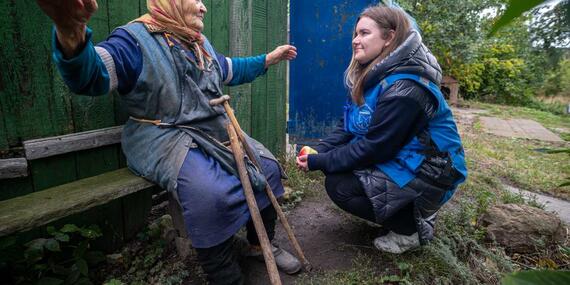Today's top news: Ukraine, Türkiye, Syria

Ukraine
The country has experienced another massive wave of strikes that, once again, killed civilians in several regions of the country. They also struck civilian infrastructure in many parts, including the capital Kyiv.
The strikes – the first of this type in more than a month – hit power infrastructure across the country. In Kyiv, nearly 40 per cent of the people have been left without heat, while 15 per cent of homes and business lost access to electricity, according to the authorities. In Kharkiv, it has been reported that the entire population of the city, 1.4 million people, has no heating, electricity and water.
According to local authorities and humanitarian partners, in Kherson at least three civilians were killed at a bus stop in the city centre, which was understood to be hit by a missile. Civilians were also killed and injured in Lviv, close to the border with Poland, and houses and other infrastructure were damaged in Zaporizka and other front-line regions.
As the Secretary-General stressed yesterday in Kyiv, the United Nations has stayed on the ground delivering desperately needed humanitarian aid to millions of people in Ukraine.
Syria
OCHA continues to ramp up the response across the country, where at least 8.8 million people have been affected.
The earthquakes, among other factors, significantly impacted the cholera response. Access to services, the capacity of our partners, funding, and the mental health of responders themselves have been affected.
Humanitarian partners have launched a cholera vaccination campaign in earthquakes-hit areas of north-west Syria on Tuesday. They plan to distribute 1.7 million vaccine doses in high-risk areas. More than 53,000 suspected cholera cases and 23 associated deaths have been reported in north-west Syria as of 5 March. More than 100,000 people in communities where water infrastructure was damaged have received water since the start of the response across affected areas. Humanitarian workers have also provided hygiene kits to more than 100,000 people in reception centers.
3.7 million children in earthquake-affected areas across Syria are facing the risk of contracting diseases and lack access to basic services.
Urgent funding is required to meet the most immediate needs of people affected by the earthquakes. To date, the Syria Earthquake Flash Appeal has received $218 million, or 55 per cent, of the nearly $400 million needed.
Türkiye
OCHA continues to support the Government-led response to the earthquakes.
The UN and our partners have provided over 42,000 tents and hundreds of thousands of blankets, bedsheets, and mattresses.
More than 900,000 people have received food assistance and the World Food Programme has supplied more than 5.7 million food packages and hot meals.
The World Health Organization have provided healthcare to nearly 24,000 people
UNICEF reached 319,000 people, including more than 183,000 children, with hygiene kits and non-food items, winter clothes and heaters, among other critical supplies.
To date, the Türkiye earthquake appeal of $1 billion is 10.4 percent funded with $104.3 million received.
